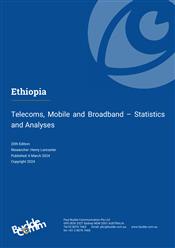Ethiopia Telecoms Market Report
Telecoms, Mobile and Broadband - Statistics and Analyses

Last updated: 6 Mar 2024 Update History
Report Status: Current
Report Pages: 119
Lead Analyst: Henry Lancaster
Contributing Analyst: Peter Lange
Ethiopia Telecom extends 5G to six cities
The slow process to open up Ethiopia’s telecom market was partly achieved with the licensing of the Safaricom-led Global Partnership for Ethiopia consortium. The country had been one of the last in Africa to allow its national telco a monopoly on all telecom services including fixed, mobile, internet and data communications. This had stifled innovation, restricted network expansion, and limited the scope of services on offer.
The prolonged attempts by the telecom regulator to issue a third renewable 15-year licence, thus promoting more effective competition against Ethio Telecom and Safari Ethiopia, has been mired with delays. A request for bids was issued in July 2023, and though there was some interest shown by international telcos no bids were made, possibly due to uncertainties regarding the ongoing conflict in the north of the country. As a result, in November 2023 the licensing process was again suspended.
The country’s mobile platform has mostly been provided by ZTE and Huawei, which have offered vendor financing. Ethio Telecom has placed the expansion of LTE services as a cornerstone of its investment program, while it has also launched 5G services. By January 2024 5G was available in six of the major cities. The platform is considered central to the government’s Digital Ethiopia 2025 strategy. The government also has embarked on its Homegrown Economic Reform Agenda and Ten-Year National Development Plan (2021-2030). The consecutive five-year Growth and Transformation Plans have also guided the overall economic development of the country. In conjunction with these national schemes, there has also been a focus on widening the reach of the national backbone network, and providing additional international cross-border connectivity.
In a bid to develop digital inclusion, the World Bank in December 2023 issued a $350 million loan to support the national rollout of the biometrics-based Digital ID in the country, known as Fayda. The ID will potentially be issued to 90 million people by 2028, improving their access to services and economic opportunities. While securing a digital ID is voluntary, it is compulsory for people to access government services.
Key developments:
- Safaricom’s mobile network covering 30% of the population, with capex expected to reach KShs45 billion in fiscal 2024.
- Ethio Telecom extends 5G to six cities.
- New Digital ID made compulsory to access government services.
- Raxio Group opens its Tier III data centre at the ICT Park in Addis Ababa.
- Orange Group decides against buying a stake in Ethio Telecom.
- Ethiopia becomes a member of the BRICS trading bloc.
- Government planning to sell 10% of the capital of Ethio Telecom via an IPO to be held later in 2024.
- Telecom regulator again suspends process to issue a third Unified Telecommunications Operator Licence to operate alongside Ethio Telecom and STE.
- Safaricom sees potential in diversifying service offerings to include the fixed, wholesale, and enterprise markets.
- Government promotes Digital Ethiopia 2025 strategy in collaboration with the Internet Society.
- Safaricom signs up 3.1 million M-PESA customers by end-2023.
- Report update includes updated Telecom Maturity Indexes charts and analyses, Ethio Telecom and Safaricom Ethiopia data to December 2023, recent market developments.
Companies mentioned in this report:
Ethio Telecom (formerly Ethiopian Telecommunications Corporation, ETC), Safaricom, Vodafone, Vodacom, Kandu Global Telecommunications, Electromecha International EthioNet, Ethio Mobile, Orange Group, Tecno Telecom, Smadl, Tana Communication, Thuraya
Related Reports
- Africa - Fixed Broadband Market - Statistics and Analyses
- Africa - Mobile Infrastructure and Mobile Broadband
- Africa - Mobile Network Operators and MVNOs
- Democratic Republic of Congo - Telecoms, Mobile and Broadband - Statistics and Analyses
- Morocco - Telecoms, Mobile and Broadband - Statistics and Analyses
- Sierra Leone - Telecoms, Mobile and Broadband - Statistics and Analyses
- Senegal - Telecoms, Mobile and Broadband - Statistics and Analyses
- South Africa - Telecoms, Mobile and Broadband - Statistics and Analyses
- Zambia - Telecoms, Mobile and Broadband - Statistics and Analyses
- Rwanda - Telecoms, Mobile and Broadband - Statistics and Analyses
Share this Report
TMT Intelligence
A platform to scale your intelligence tasks
Monitor critical insights with our AI-powered Market Intelligence Platform gathering and analyzing intelligence in real time. With AI trained to spot emerging trends and detect new strategic opportunities, our clients use TMT Intelligence to accelerate their growth.
If you want to know more about it, please see:
Research Methodology
BuddeComm's strategic business reports contain a combination of both primary and secondary research statistics, analyses written by our senior analysts supported by a network of experts, industry contacts and researchers from around the world as well as our own scenario forecasts.
For more details, please see:
More than 4,000 customers from 140 countries utilise BuddeComm Research
Are you interested in BuddeComm's Custom Research Service?
Hot Topics
News & Views
Have the latest telecommunications industry news delivered to your inbox by subscribing to BuddeComm's weekly newsletter.